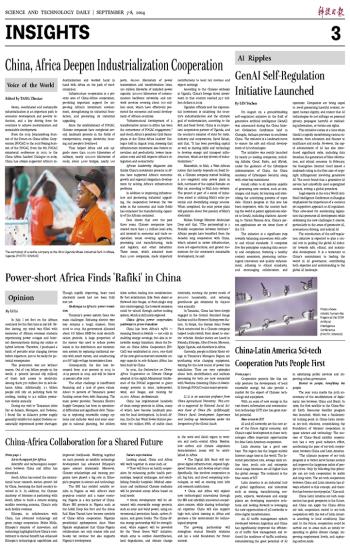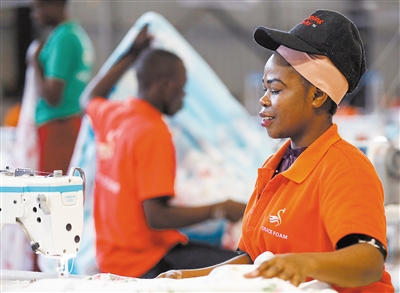
 |
| The workshop of a textile company at the Sino-Uganda Mbale Industrial Park in Mbale, Uganda. (PHOTO: XINHUA) |
Green, coordinated and sustainable industrialization is an important path to economic development and poverty reduction, and a key driving force for countries to achieve modernization and sustainable development.
From the 2015 Johannesburg Summit of the Forum on China-Africa Cooperation (FOCAC) to the 2018 Beijing Summit of the FOCAC, from the 8th FOCAC ministerial conference in 2021 to the China-Africa Leaders' Dialogue in 2023, China has always supported Africa's industrialization and worked hand in hand with Africa on the path of modernization.
Infrastructure cooperation is a priority area of China-Africa cooperation, providing important support for improving Africa's investment environment, strengthening its industrial foundation, and promoting its industrial upgrading.
Since the establishment of FOCAC, Chinese companies have completed several landmark projects in the fields of transportation, energy, electricity, housing and people's livelihood.
They helped Africa add and upgrade more than 10,000 kilometers of railways, nearly 100,000 kilometers of roads, about 1,000 bridges, nearly 100 ports, 66,000 kilometers of power transmission and transformation lines, 120 million kilowatts of installed power capacity, 150,000 kilometers of communication backbone networks, and network services covering about 700 million users, which have effectively promoted the economic and social development of African countries.
"Infrastructural development of a transformative nature in Africa has been the cornerstone of FOCAC engagement," said South Africa's president Cyril Ramaphosa at the China-Africa Leaders' Dialogue held in August 2023, stressing that infrastructure investment also fosters innovation and productivity, lowers transaction costs and will improve Africa's integration and connectivity.
African Leadership Magazine also thinks China's investment projects in Africa have supported Africa's economic growth and regional integration development by solving Africa's infrastructure problems.
In addition to improving infrastructure and promoting industrial upgrading, the cooperation between the two sides in the economic and trade fields has enhanced the manufacturing capacity of the African continent.
Data shows that over the past three years, Chinese companies have created more than 1.1 million local jobs, and invested in economic and trade cooperation zones covering agriculture, processing and manufacturing, trade and logistics, and other industries. These zones, which attracted more than 1,000 companies, made important contributions to local tax revenue and export earnings.
According to the Chinese embassy in Uganda, China's foreign direct investment in that country reached 55.7 million dollars in 2023.
Ugandan officials said the exponential investment is catalyzing the country's industrialization and the ultimate goal of modernization, according to the Belt and Road Portal. China is an important cooperation partner of Uganda, and the country's minister of state for trade, industry and cooperatives, David Bahati, said that, "It has been providing capital as well as sharing skills and technology to develop energy and transport infrastructure, which are key drivers of industrialization."
Meanwhile, in Mali, a West African nation that heavily depends on fossil fuels, a Chinese company started building a 100-megawatt solar power plant in Safo, northeast of the capital Bamako on May 29, according to Mali Actu website. The project is part of a series of initiatives aimed at utilizing Mali's solar potential and diversifying energy sources. When completed, the solar power plant will generate about five percent of Mali's electricity.
Malian Foreign Minister Abdoulaye Diop said that, "[The partnership] is a friendly cooperation between brothers." African people have benefited from the decades long cooperation with China, which ushered in newer infrastructure, more job opportunities, and greater momentum for the continent's sustainable development, he said.


 Next
Next




